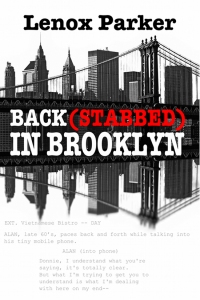 Independent writers have the opportunity of a lifetime. We are on the cusp of a revolution in breaking open the audience for our work. Millions of e-readers were opened under the tree, and all of us writers are standing on the sidelines watching and hoping and wringing our hands that our work will be chosen to be downloaded.
Independent writers have the opportunity of a lifetime. We are on the cusp of a revolution in breaking open the audience for our work. Millions of e-readers were opened under the tree, and all of us writers are standing on the sidelines watching and hoping and wringing our hands that our work will be chosen to be downloaded.
And we need our shit to be good. Really fucking good. Like so good, that grandma may actually break her 40-year streak in reading crime novels and read your anthology of shorts. We have this opportunity to kill the conventional publishing machine (no, it’s not dead yet, don’t get so comfortable). It belongs to us. This revolution was made for us. Now. What are you doing about it?
We can take convention and turn it on its ass. But only if we know entirely what we’re doing.
I’m all for breaking down the walls. But until we are experts in our writing abilities, we should not experiment too broadly.
(*I’m not making an empirical judgment though: there are a few writers who are so brilliant from the start that they can make and break the conventions all they want.)
(** And I am also not talking about the mode of publishing their work, either. This essay strictly addresses the style of experimental writing rather than the approach to marketing and publishing the work.)
If a writer is not flexible or creative enough to be able to learn the craft expertly before he begins to experiment, he may likely run into trouble. I did that a few times. I thought I was so stylie and I go back and read that stuff from back when, and it was not good. I was all into doing things differently, but I had no anchor. And I am not as intrinsically talented as some other writers who can do the most innovative things a compelling piece of art.
I don’t think that the independent writing community can afford to fall into line with conventional, mainstream publishing, however. There is a cultural need for innovation and creativity and we need to feed that. But we need to feed it with quality work, not off-the-cuff weird shit that just doesn’t have any compelling reason to exist because it just isn’t good.
Then this begs the question of what experimental work is good…and I’m not looking for a debate down that road. When I say something isn’t good, it generally isn’t original, or it isn’t compelling. But worst, an experimental work that isn’t good is generally contrived.
- Writing with funky fonts and calling yourself a non-linear writer is just incongruent.
- Writing a Twitter novel has been done, and so it is no longer necessarily unconventional.
- Jumping on a bandwagon genre trend is not experimental.
There are so many brilliant and interesting ways of breaking the rules and creating compelling work. But I contend that unconventional work is compelling in its integrity. And excellent writers have the breadth of experience to approach experimentation seamlessly–rookies should stick to learning the craft of writing first.
We cannot afford to have independent authorship appear to be too disjointed, with inconsistent quality. I welcome work that comes from out of left field–but the body of work we produce is now out of the shadows and under much more public scrutiny. If all those folks who receive e-readers from the xmas stork encounter download after download of shitty work or dubious quality, we are all–as a community–wasting an opportunity to introduce independent publishing to millions of new readers.
The time is NOW. Let’s get our shit together. Let’s be more careful about what we put out there. I count myself in that group as well–I’ve been guilty of putting shit quality short stories out there and I am going to stop doing that. I only want the absolute best of the best of freaky, bizarre, or even conventional storytelling with my name on it floating around the interwebz.
Get an Editorial Review | Get Amazon Sales & Reviews | Get Edited | Publish Your Book | Enter the SPR Book Awards | Other Marketing Services






















Lenox, I’m put off as much as you are whenever I read something touted as “experimental” or “innovative” when it’s simply jejune and confused. I doubt, though, that writers who wish to produce that sort of thing are a threat to you or me. The market will decide, as it always does. Everybody knows a lot of independent writing is unreadable. But I think we’ve reached the point where many people understand why some independent writers, exercising the same freedom enjoyed by those who can’t (yet) write anything worthwhile, are writing and publishing books that will be read a hundred years from now.
Thanks so much for reading and responding.
I don’t view other writers–good or bad–as a threat, it’s just a different mindset for me.
I started conceptualizing this post a week or so before Christmas as I saw so many ads for e-readers. Then Santa got my mom a Kindle, and she’s about as technologically adept as a sandwich. Her idea of finding books for her Kindle was not what I envisioned for myself when I started reading electronically–she was going to her same book-club reading lists, and the NYT bestseller sham. I mean list.
So I thought, my mom wouldn’t even find my own books, even if I told her where to look. So in a way, your message about good independent writing not getting mixed up with bad indie writing is indeed valid. BUT, we are still far, far away from reaching potentially the audience we could, so I find in a way that this era of a deluge of e-books could break down those walls for folks like my mom.
There is so much to develop in this field, it’s exciting, but daunting as well.
Thanks a lot.
len.
I don’t know how other people find books by independent writers. It kind of seems impossible in a way! People mostly know what they are shown and what they hear about. When it comes to independent writers that are publishing online, the main sources are the aggregators’ sites (Smashwords, Feedbooks, Amazon, etc) and various independent publishing websites.
Those sites are the only way that I have found interesting independent writers, such as Lenox Parker (who I found through a comment by Moxie Mezcal posted on this website). But is the way that readers in general will ever find independent authors, or mainly a way for independent authors to find each other?
I don’t think that independent authors face any more daunting odds now than previously. It’s always been a needle in a haystack challenge. There’s no shortage of stuff out there, that’s for sure. My guess is that the quality-to-crap ratio is probably some kind of universal constant!
Eck, you are probably right. But, my altar ego was lucky enough to get some visibility and sell a few thousand e-copies on Amazon last month. While that didn’t quite pay the mortgage for $.99 each, there are small windows of opportunity in which we can really break out. There are a few indie success stories out there.
The one thing I don’t understand yet though is whether giving our e-stuff away for free or next to free is a legitimate means of garnering wide readership. I’m trying it, but there HAS to be another way to gain more visibility.
Thanks so much for reading and for your support!
len
Tom, I especially like your last sentence, even if it’s probably all too true.
Hey there,
Great article. You are right about so many things.
As for giving content away, it’s working very well for me at the moment, but then I’m “lucky” as I have a series of 5 novels, so giving the first one (50 Reasons to Say Goodbye) away is producing masses of “free” advertising for the four sequels leading to significant sales.
But it’s great to see the public voting with their feet (or fingers or whatever) in favour of independent writers who the useless publishing monoliths have ignored for so long. Frankly, they deserve everything they have coming.
Nick x
One thing I find encouraging, as a soon to self publish indie writer, my work on Smashwords and Amazon POD does not have a shelf life.
I didn’t write about handsome vampires or powerful elves, but perhaps stories of a hacktivist cyberwar for human rights will be popular next year. A big six book published today will be a memory by then. A contract signed today will be in print too late. My efforts will be there waiting, for years if need be — online.
Then readers will decide my fate.
Allen is right, there are so many increasing opportunities for authors to be successful online. Although, with progressive marketing options provided by companies like Outskirts Press, readers can be sold on much more than a good book. And with marketing in the long-tail, authors can find niche markets. What may appeal to me could be absurd to the next. What may be true is that gone are the days when a handful of books can appeal to an entire society.